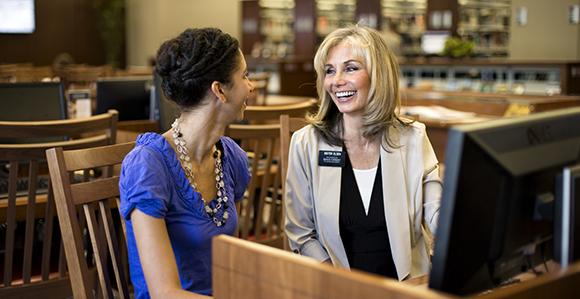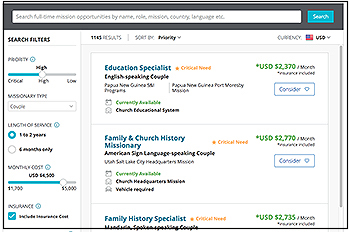Senior Missionaries Needed Worldwide; Explore Service Options Online
Contributed By Marianne Holman Prescott, Church News contributor

A Church-service missionary helps another woman with her family history.
Article Highlights
- Several kinds of assignments are available for prospective senior missionaries.
- Many senior missionaries are needed in various assignments worldwide.
“You are needed.” —Chris M. Miller, Church Missionary Department
Related Links
When Bruce and Valerie Bowen from Burley, Idaho, were first married, they decided that someday, after raising their children and retiring from work, they would like to serve a mission together.
“We’ve always planned to serve a mission,” said Sister Bowen. “It wasn’t a decision we made in the last year.”
When Bruce Bowen’s retirement became a possibility, the couple began to think about a mission. The couple felt they had a few things they still needed to do before they were ready to go but decided to start the process.
The Bowens continued to prepare until they received some advice from their stake president: “Don’t put it off.”
The couple began to recognize that there is “always something going on,” and the advice from their Church leader kept coming back to them: “Don’t wait.”
“I’m so glad we followed that counsel,” said now-Elder Bowen, who serves with his wife as a self-reliance missionary in the Tennessee Knoxville Mission. “It has been such a good experience.”
Elder and Sister Bowen have been serving in Tennessee for nearly 17 months. Their assignment has been to teach self-reliance classes in areas all over their mission boundaries.
They are part of the Church’s 5,800 full-time senior missionaries and more than 23,000 Church-service senior missionaries serving throughout the world.
Although those numbers are impressive, they are only a portion of what is desired, said Chris M. Miller, who works for the Missionary Department of the Church, during a BYU Education Week presentation.
To anyone who is thinking about serving a mission, the answer is clear: “You are needed,” said Miller.
Choosing a path
For prospective senior missionaries—both married and single—missionary service is something many have been looking forward to for years.
“The closer we kept getting to retirement the more real it became,” said Rachele Walker, from American Fork.

Elder Bruce Bowen and Sister Valerie Bowen are serving as self-reliance missionaries in the Tennessee Knoxville Mission alongside several young elder missionaries. Photo courtesy of Sister Valerie Bowen and Elder Bruce Bowen.
Rachele Walker’s husband, Mark, retired about two months ago.
“Now we have to decide what kind of a mission we are going to do,” said Mark Walker. “Maybe the resolve is multiple missions.”
With so many options available today, prospective missionaries are able to choose whether they will serve a full-time mission or a Church-service mission.
“Full-time missionaries are so needed throughout the world,” said David L. Williams, global operations manager for the Church’s Service Missionary Program Office, during the BYU Education Week presentation. “Our greatest need is outside of the United States, and full-time service is preferred when family, health, and financial circumstances allow.”
Full-time senior missionaries do the following:
- They serve as a couple and live away from home.
- They generally serve for 12, 18, or 23 months, with some 6-month mission calls.
- Their call comes from the prophet, and as a full-time missionary couple they report to a mission president, temple president, or area president.
- They receive a medical exam, which is required to serve a full-time mission, and health insurance is available to them while they are serving.
- The missionaries pay for full-time missions, although there is a monthly housing cap.
While potential full-time missionaries are able to indicate their skills and experience and identify a preference for assignment types and locations, ultimately their call is done on behalf of the President of the Church and the assignment is done by inspiration. So, although a preference is suggested, it doesn’t ensure the couple will receive that specific call.
“We recognize not everyone is able to serve a full-time mission,” said Williams. “Some may not be able to leave home.”
For those who have a desire to serve but may have some personal, financial, or professional obligations that keep them from serving a full-time mission, Church-service missions are another option.

A senior sister missionary in the Philippines interacts with young missionaries.
- They can serve as an individual or couple and are able to serve in a more flexible way.
- They serve under the direction of their local leader and live at home.
- Service can be 6, 12, 18, or 24 months, oftentimes with the option to extend.
- They are able to serve as few as eight hours and up to 40 hours per week.
- A medical exam is not required, although the missionaries must be healthy enough for their assignments.
- Church-service missionaries can be employed during their time of service and are responsible for their own living expenses, including insurance.
- A potential Church-service missionary applies for a specific assignment, and the stake president approves the request. The stake president may know of different service opportunities than what is listed and potentially could ask the candidate, or candidates, to serve in another assignment.
- The stake president extends the call.
Although single women are eligible to serve as either a full-time or Church-service missionary, single, divorced, or widowed men are able to serve only as Church-service missionaries.
Church-service missions are also a great option for couples who may not be in a position to serve together—such as one spouse is still working or has physical limitations.
Options to serve
The Church has created a website—seniormissionary.ChurchofJesusChrist.org—in the past few months in an effort to help prospective missionaries explore various options of service to fit their situations.

A snapshot from seniormissionary.ChurchofJesusChrist.orgof some of the filters potential missionaries are able to fill out to find a more customized mission plan.

A snapshot from seniormissionary.ChurchofJesusChrist.orgof some of the filters potential missionaries are able to fill out to find a more customized mission plan.
There are several ways available for missionaries to serve, including assignments to do the following:
- Teach and fellowship
- Interact with the public
- Preserve and share Church history
- Preserve family history records
- Feed the hungry
- Help people become self-reliant
- Support Church operations
- Serve in a temple
- Support young adults
- Participate in the addiction recovery program
- Manage and maintain Church properties and facilities
- Use skills from a person’s professional background
The website allows a person or couple to customize their search, matching their abilities, availability, and interests with the current needs in full-time and Church-service missions, both near and far.

An image of the new senior missionary website shows opportunities available for potential full-time missionaries.
In essence, the website allows a person—while setting parameters such as budget, location, and abilities—to glance at all of the opportunities for service around the world.
“There is a consider button,” said Williams. “It is like [an online] shopping cart.”
As a couple searches, they are able to mark and save different assignments that are appealing to them. For individuals and couples who have even the slightest interest, Williams said a quick look at the website proves there are options available for many different circumstances and backgrounds.

An image of the new senior missionary website shows opportunities available for potential full-time missionaries.
Preparation
“We encourage you to have five conversations,” said Art Johnson, manager of Senior Missionary Services in the Missionary Department of the Church. “The first conversation is with Heavenly Father. Seek His counsel and His guidance, and we anticipate you will be guided by the Spirit to understand His will for you and your family. … We encourage you to have an honest self-assessment of your health, your financial situation, and your family concerns. You know your situation best.”
Another important step is a frank conversation with a spouse, determining together what the best plan would be, as well as conversations with priesthood leaders and with family.
“This is a time to be really honest with yourself,” Johnson said. “We don’t want mission calls to cause disharmony.”
Johnson also said that prospective missionaries must remember that their lifetime of service has prepared them for missionary service.
“You have raised teenagers!” he joked.
Overcoming fears and myths
To those who are thinking of serving a mission but are worried about the assignments they might be asked to do, Johnson said it is important to know what is expected of senior missionaries.
“Senior missionaries are not required to tract or knock on doors,” he said.
They are not required to learn a foreign language, maintain the same schedule as young elders and sisters, or, depending on their assignment, wear Sunday dress all of the time. They are able to call family freely and even watch television if they choose.
“Between texting, email, and phone we have been able to keep in touch [with family],” said Elder Bowen.
For the Bowens, communicating with their family was a concern before they left.
“We FaceTime all the time,” said Sister Bowen. “We’ve missed a few major family events, but our children have helped us be a part of things.”
In addition to senior missionaries being able to call family members when they would like, they are also able to set their schedule at the pace they are comfortable. They are not required to be with their spouse at all times.
As someone who was a little nervous before leaving rural Idaho to serve in a big city on her mission, Sister Bowen said of her experience, “Not long ago we met a new couple and flashbacks of nervousness of little things came back. All of those fears go away. They don’t seem so big now. And it didn’t take long.”
Blessings of service
For the Bowens, serving a mission has been a “grand experience,” one even better than they had anticipated.
Even after 44 years of marriage, “we have had to depend on each other,” said Elder Bowen. “It has made our marriage closer as we have had a joint focus.”
The couple has enjoyed meeting all different kinds of people—both members of the Church and people outside of the Church. One of the highlights of their mission has been working with the young missionaries.
“We have loved being a part of zone conferences and district meetings,” Sister Bowen said. “It has been a neat experience, and we have been so blessed and taught by the young missionaries. I have a greater respect for my three sons who served missions.”
The Bowens have loved seeing how their family has reacted to their service.
“I think our kids and grandkids are proud to have us on a mission,” said Elder Bowen. “I hope they see our commitment to follow the call of a prophet to serve a mission.”
The thought of finishing their mission in just a few months is a little bittersweet.
“Closing the trunk lid isn’t going to be as easy as we thought it would be,” Elder Bowen said.
Their advice to prospective missionaries: “Don’t wait!”

Sister Valerie Bowen and Elder Bruce Bowen spend some time sight-seeing along the Appalachian Trail on one of their preparation days. Photo courtesy of Sister Valerie Bowen and Elder Bruce Bowen.
